
![]()
400 years VOC
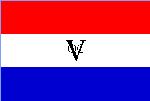
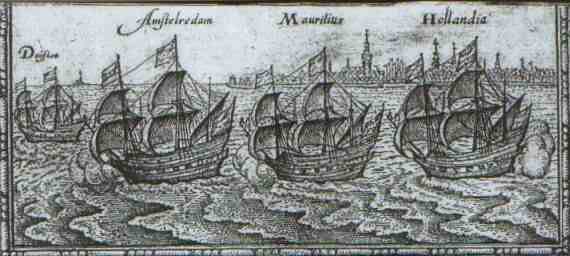
This is a part of the title page of the 'Journaal van de reyse der Hollandtsche schepen' (Journal of the voyage of the Dutch ships) as published in the town of Middelburg in province of Zeeland in 1598. The yacht Duyfken is the small ship to the left.
For the remembrance of 400 years VOC see URL: http://www.voc2002.nl
The VOC was founded (see above) on March 20, 1602, so within short the 400th Anniversary of the VOC is a fact. Festivities to commemorate the 400th anniversary are planned. Part of this is that a replica of the yacht Duyfken is sailing from Australia to Holland at the moment. Today (March 5, 2002) the Duyfken is near the Azores.
As part of the festivities in remembrance of the fact that 400 years ago four VOC sailing set sail for the Far East and Australia, a replica of the 17th century VOC ship (yacht) 'Duyfken' (=small pigeon) is sailing from Australia to Holland. This picture was taken in September 2001 against the historic background of the harbour of Galle (Sri Lanka). Historic sights revived again! (Photo Algemeen Dagblad, March 5. 2002)
This picture was shown in the Dutch newspaper Algemeen Dagblad of Saturday April 27, 2002 The Yacht Duyfken will arrive on Sunday April 28 from Australia in Holland. The text underneath the picture says: "The replica of the 17th century's VOC ship Duyfken is ploughing the waves of the North Sea on its way to the island of Texel. After a journey of 18.000 sea miles from Australia - via Jakarta, Cape Good Hope and the Azores islands - the ship will be welcomed by prince Willem-Alexander of the Netherlands. Photo by Cor de Kock" The only thing different with the original Duyfken is the flag flying from the poop deck!
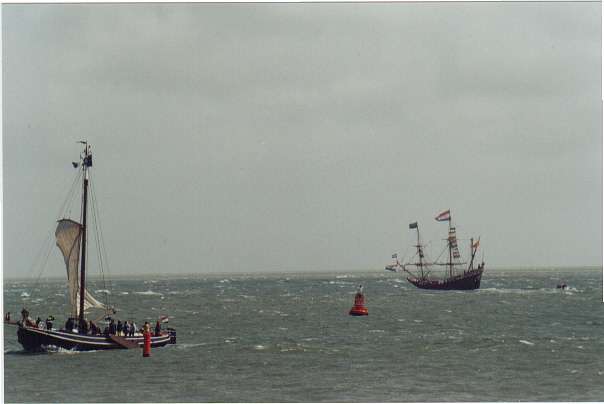
The revival of 'Medieval Shipping Times'. The Yacht Duyfken approaching Texel roads after a long journey from Australia. Apart from the modern red buoy not much has changed since then...... In the next picture the ship is closing in on the shore. - Photo by Jan Dissel
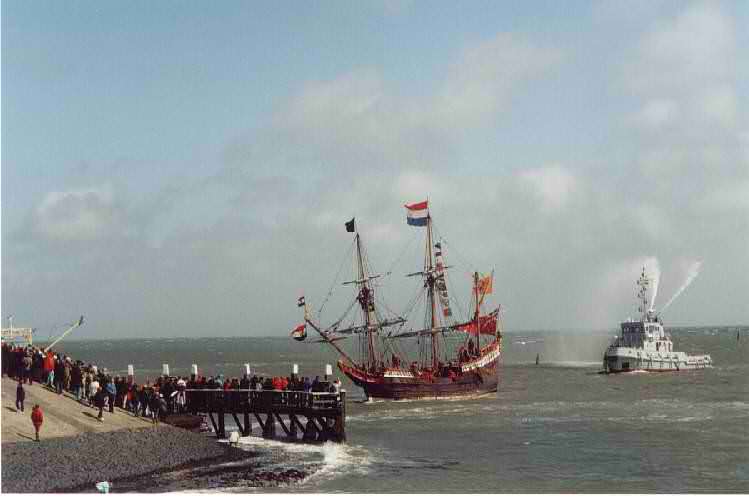
The yacht Duyfken arriving on April 28th from Australia on the Texel roads and welcomed by ships and a crowd ashore near the small island city of Oude Schild. In the old days ships departed from the very same Texel roads for their exploits to the Far East. Picture taken by our flying reporter and friend Jan Dissel, who was spending his holidays on the island then. Mission accomplished!
http://www.dlm.org/voc This is the anti-VOC web site, in Dutch only. The Dutch used to suppress all opposition with considerable violence and if necessary carried out 'Hongi' expeditions to enforce their law and monopoly claim of the spice trade. Hongi was the Molucca name for rowing vessels. A fleet or armada of such vessels was also called a hongi. Hongi had to be delivered and manned by each village of couple of villages and were accompanied by the Dutch soldiers when on expedition. In the 17th century the islands population of the Moluccas went down by about 37 percent, due to the ongoing wars between the VOC and the local opposition.
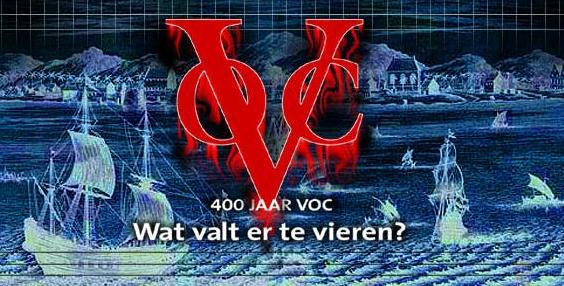
The logo of the anti-VOC web site. The text says: 400 years VOC What's there to celebrate?
In 1608 four VOC executives Fortuyn, Thomasz, van Campen en Sem stepped down because of the abundant use of violence of the VOC.
In 1655 Arnold de Vlamingh ends the war in the Molluccas, again with the use brutal force. Only on the islands of Ambon and Lease clove trees are being grown now. The 'tree of doom' (pohon koetok) has been destroyed on all the other islands and the desired volume can so be easily controlled, for instance the excess growth of clove trees is destroyed.
In 1769 the French succeed in stealing clove seeds from Ambon and bring them to Mauritius, Reunion and other French colonies. From that year on the Dutch make yearly inspections of Ceram and other islands to destroy all clove trees.
Between October 23 and November 9, 1776 a Hongi is directed at the island of Hoamoal and under the supervision of VOC officers 16.252 clove and nutmeg trees and 47.403 other trees are destroyed.
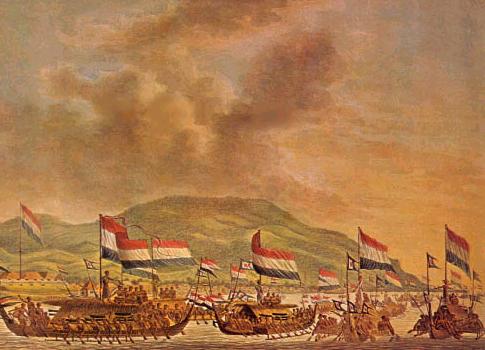
Hongi in the bay of Ambon in 1817 called together for the fight against Pattimura (Original: Aquarel by van Verhuell).
Because of the facts mentioned above the about 50.000 Mollucans in our country are not at all happy with the programmed festivities.